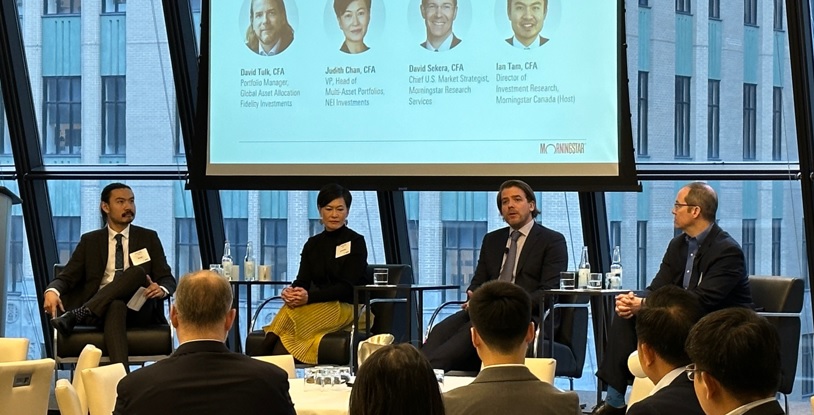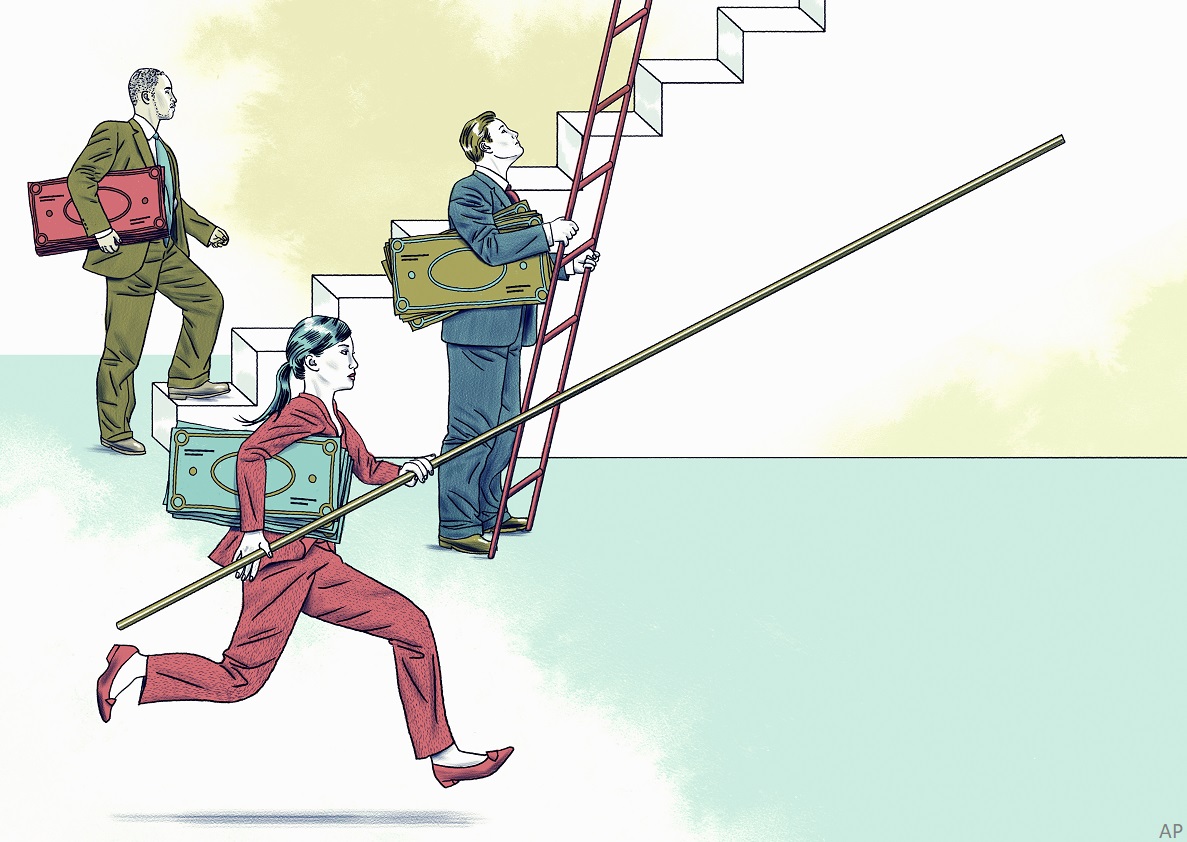
Many investors started this year worried about their investments. The Bank of Canada held rates steady, after eight rounds of hikes. Inflation continues to be a thorn in the side of central banks and investors alike, and fears of a recession abound.
But a panel of experts told attendees at Morningstar’s latest Executive Forum—the first for 2023, and the first in-person forum since 2020 — that some of these fears might be overblown. The forum, titled "The 2023 Market Outlook," addressedinflation, rate hikes, ESG, thematic investing, and investment opportunities in 2023.
The panellists were Judith Chan, VP, Head of Multi Asset Portfolios at NEI Investments, David Tulk, Global Asset Allocation Portfolio Manager at Fidelity Investments, and David Sekera, Chief U.S. Market Strategist for Morningstar Research Inc. The panel was moderated by Ian Tam, director of investment research for Morningstar Canada.
Morningstar Thinks Inflation Has Peaked, No (or Soft) Recession Likely, Panelists Disagree
Speaking to Morningstar’s house view, Sekera said that the outlook for inflation is positive in the U.S. “We think inflation peaked last fall and has since been falling and will continue to fall till the end of the year. We see U.S. inflation as being at 3.2% for the end of the year, and below 2% for next year, which is below Wall Street estimates. We think the factors that caused high inflation in 2022 are broadly over in the U.S.” He also added that Morningstar expects the Q3 and Q4 of 2023 to see stagnant growth, but our base case assumes a soft landing or no recession.
Both Chan and Tulk disagreed.
“We think Canada has reached peak rates, but the U.S. still has more room to go. Canadians are more indebted than Americans, especially when it comes to money tied up in housing. Real estate in Canada has gone from 5% of GDP to nearly 11%. If interest rates were to rise further from here, there would be much more damage to the economy,” she said, adding that she does not foresee any rate cuts this year.
Tulk said that Fidelity is not optimistic about inflation coming down. “We think while the worst may be over, inflation itself is not over. The factors that are likely to drive inflation are services and the labour market. There is an ongoing tightening of the labour market in the U.S. and Canada, because of a supply and demand mismatch. As a result, we think interest rates will likely stay elevated,” he said.
Canadian Indebtedness a Concern, Bonds Are Attractive
Chan pointed to the high levels of debt among Canadians as being a concern. “The Bank of Canada has two jobs – focus on employment on the one hand, and the economy on the other. With the inflation and red-hot labour market being what it is right now, for inflation to fall from current levels to 4% will not hurt a lot, but for inflation to fall from 4% to 2%, will cause a lot of pain. Because Canadians, unlike the U.S., have variable rate mortgages, the fact is that they will feel a lot more pain when it comes to higher rates,” she said.
Tulk had another view. He used to work at the Bank of Canada, and drawing on this experience, he said that for the Bank, “Inflation is jobs one, two and three. I get the sense that housing vulnerability management is a ‘nice-to-have’ for the Bank, and it would rather leave that to macro-prudential frameworks like the CMHC. The bank has two options – lean into an asset bubble to make policy decisions or let the bubble pop and then clean up the mess later. I feel that the bank watches inflation, and if inflation becomes unhinged, the bank will focus only on that, and deal with the fallout later,” he said.
Don’t Give Up on the 60-40 Portfolio
2022 was a brutal year for the 60-40 portfolio.
“Last year, the 60-40 portfolio saw its worst year since the Great Depression, because of an inflation shock that hammered bonds. The correlation between stocks and bonds turned positive. Fact is, as long as you’re worried about inflation, you need to be creative on the 40% side of the 60-40 portfolio. We are creative on the credit side by using enhanced yield securities. At the same time, we’re also using currency to generate income,” Tulk said.
Chan agreed but added that a lot has changed since 2022. “The correction in equities has reduced the froth in the market. Bonds are again attractive for yield, with less risk. I think we can hope that the worst is over for the 60-40 portfolio. Don’t give up on it," she said.
Where In the World Are the Opportunities?
To Tulk, allocation comes down to macro drivers. “Volatile inflation will negatively impact correlation, but this makes short-duration bonds more attractive. But with higher rates, it means we won’t need to seek more exotic securities for the 40% allocation in the 60-40 portfolio. Traditional assets will be enough. We don’t need to look at currency, or commodities (on the equity and direct side) as we are doing right now,” he said.
In terms of regional exposure, Tulk thinks Canada and the EU are more sensitive to rates, so he is underweight those two regions. “We have a modest overweight position on the U.S. at the expense of Canada. We are overweight on Emerging markets. We think EMs have a strong elastic that binds them to the rest of the world, and we think there are positive steps in the space, like the removal of Zero COVID in China," he said.
Chan disagreed. “We are not as positive on EMs. We think they are geopolitically less stable, and this plays into the risk. As a result, we are overweight on North America, because we think the region can rebound better. Plus, growth expectations are higher for the U.S. So we are overweight U.S. and underweight the rest. The fact is, though, we are moving from globalization to regionalization. I expect shorter investment cycles, and shorter business cycles,” she explained.
Does It Make Sense to Consider Thematic Investing?
Morningstar has long held the view that investors in thematic funds are making a trifecta bet. They are betting that they are:
- Picking a winning theme;
- Selecting a fund that is well-placed to survive and harness that theme, and
- Making their wager when valuations show that the market hasn’t already priced in the theme’s potential.
It is difficult, if not impossible, to consistently get all three right.
Tulk agrees that thematic investing is really hard. “If investing is based on tangible models, that’s fine. If it’s driven by sentiment, then it isn’t. People need to do proper due diligence on themes. As long as a balanced portfolio forms the core of a portfolio, and themes form satellites, that’s fine, but thematic investing is very difficult,” he explained.
Chan sees opportunities in specific niches, like renewable energy infrastructure, which will play a role in the energy transition. “With these situations, we look for companies in which we are “Paid to Wait.” This means looking at firms with good cashflows, with good yields. We also look at yield-enhancing opportunities like options – but we use options less now when bonds are doing so much better,” she said.
Sekera also explained one thematic play – Ark Innovation ETF (ARKK), which has a Morningstar Analyst rating of ‘Negative.' “I need to make a differentiation between thematic investing vs investing in long-term secular trends. ARKK’s investments in disruptive technology are thematic. This bet is different from investing in the tech bubble, because the companies in the tech bubble were goose eggs. This is not the case with disruptive tech. These companies have tangible business models. They were 40-50% overvalued last year and are now significantly undervalued. I’m talking about names like Shopify (SHOP) and Zoom Communications (ZM)," he said.
ESG, Anti-ESG, and Canada
Chan does not think ESG is a theme, but instead is going to become the norm in investing. “ESG or sustainable investing is not a fad. Sustainability won’t come and go. It is a risk for investors and businesses. I think sustainability will become more and more prevalent in the investing space,”she said.
When asked by the audience if the anti-ESG sentiment currently present in America will travel north, Chan said, “It well might. We have not seen it in Canada yet, but it might come here. I think Canada is less polarized than the U.S., but I might be wrong.”
To Tulk, ESG comes down to politics vs. policy. “We root ourselves in policy. From an asset allocation perspective, ESG is complicated. So we express our views through our security selection, and leave it to the fund managers to pick the securities that work best in this context.”
What Stocks Could You Buy Right Now?
On the equity side, Sekera pointed out that at present, we’re at the opposite of where we were at the start of 2022. “At the start of 2022, the U.S. was overvalued, value was undervalued, and growth was overvalued. In 2023, the pendulum has swung. We now see the U.S. as being 10-12% undervalued. For Canada, we think Canadian equities are undervalued by 5-6%. The reason this seems so much less cheap than the U.S. is that in the U.S., mega cap names like Microsoft (MSFT) and Amazon (AMZN) are very undervalued, and this in turn shifts the whole market lower. To put the numbers in perspective, Canada started 2022 5% overvalued, dropped to 15% overvalued in the downturn of Q4, before recovering to 5% undervalued now," he said.
In Canada, Sekera thinks that energy is overvalued, but he still sees opportunities in master limited partnerships, and pipelines. He points to TC Energy (TRP) as an example. “We also think Canadian banks are 5-10% undervalued. We think net interest margins will increase in the short term, and the markets are overestimating loan losses," he said.
The author or authors do not own shares in any securities mentioned in this article. Find out about Morningstar's editorial policies.





















